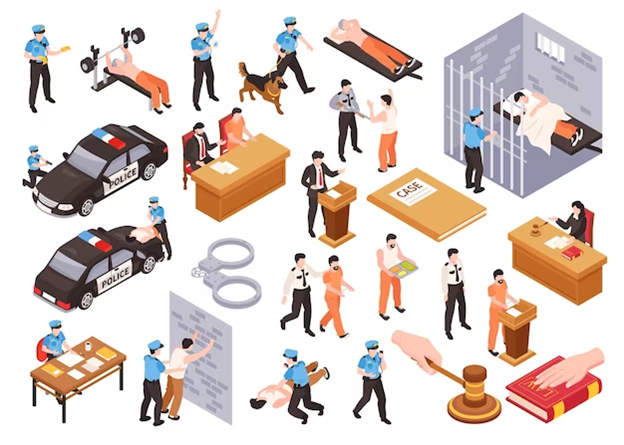Law Enforcement

Diploma in Law Enforcement (General Focus)
Duration: Typically, 1-2 years (varies by program).
Prerequisites: High school diploma or equivalent.
Trimester 1:
- LEN 100: Introduction to Law Enforcement
- Overview of law enforcement profession
- The role of law enforcement in maintaining order and safety
- Ethical considerations and professionalism in law enforcement
- CRIJS 100: Criminal Justice System
- Understanding the criminal justice system
- Roles of law enforcement, courts, and corrections
- Legal procedures and due process
- CRILP 100: Criminal Law and Procedures
- Basics of criminal law
- Arrest, search, and seizure procedures
- Legal rights of suspects and defendants
- CPC 100: Community Policing and Communication
- Community policing principles
- Building positive community relations
- Effective communication and de-escalation techniques
Trimester 2: Policing and Investigations
- PPTE 100: Patrol Procedures and Traffic Enforcement
- Patrol techniques and routines
- Traffic law enforcement and safety
- Accident investigation and reporting
- CRII 100: Criminal Investigations
- Investigative techniques and methods
- Crime scene analysis and evidence collection
- Case management and follow-up
- UFDT 100: Use of Force and Defensive Tactics
- Use of force continuum and policy
- Defensive tactics and physical fitness
- Crisis intervention and handling dangerous situations
- RWD 100: Report Writing and Documentation
- Report writing and documentation procedures
- Case files and evidence management
- Court testimony and witness handling
Trimester 3: Advanced Policing and Specializations
- SULEN 100: Specialized Units in Law Enforcement
- Overview of specialized units (e.g., SWAT, K-9, narcotics)
- Requirements and training for specialized roles
- Coordinated efforts in multi-agency operations
- CNCR 100: Crisis Negotiation and Conflict Resolution
- Crisis negotiation techniques
- Conflict resolution and mediation
- Managing high-stress situations
- SLEN 100: Specializations in Law Enforcement
- Choosing an area of specialization (e.g., criminal investigations, cybercrime, community policing)
- Specialized law enforcement skills and practices
- Emerging technologies and trends in law enforcement
Trimester 4: Licensure Preparation and Final Assessments
- LEPREP 100: Licensure Exam Preparation
- Review of law enforcement certification exams (e.g., POST certification)
- Mock exams and test-taking strategies
- State-specific requirements and regulations (if applicable)
- FATES 100: Final Assessments and Certification
- Successful completion of advanced law enforcement and specialization courses
- Successful performance in any applicable certification exams
- Graduation and award of the Diploma in Law Enforcement (General Focus)
Students have to contact the school administration if they want to take extra credits or transfer credits to pursue the Diploma Certificate or Associate of Applied Science (A.A.S.) Degree in their field of interest. Students will select required number courses in each of the areas listed to meet general education requirements graduation for the A.A.S. Some of these courses can be transferred directly from and to the university system and may be substituted for recommended courses on the outline. Students should speak with an advisor before doing so these selective courses are required for all students.
- Selected Communication Course (Choose two for Diploma or three for the Associate)
ENGL 100: Fundamentals of Speech
CPL 100: Career Planning
CPL 101: Communications and Career Strategies
ENGL 101: Composition
ENGL 102: composition
- Selected Mathematics Course (Choose two for Diploma or three for the Associate)
MATH 100:General Math
MATH 101:Intermediate Algebra
MATH 102:College Algebra
- Selected Social Science Course (Choose two for Diploma or four for the Associate)
ECON 105:Leadership
ECON 101:Principles of Microeconomics I
ECON 102:Principles of Macroeconomics II
SOC 101:Introduction to Sociology
PSYC 101: Introduction to Psychology
HIST 101: History
